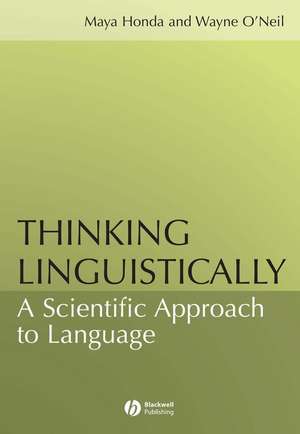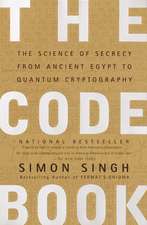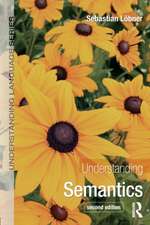Thinking Linguistically – A Scientific Approach to Language
Autor M Hondaen Limba Engleză Paperback – noi 2007
| Toate formatele și edițiile | Preț | Express |
|---|---|---|
| Paperback (1) | 387.02 lei 43-57 zile | |
| Wiley – noi 2007 | 387.02 lei 43-57 zile | |
| Hardback (1) | 706.01 lei 43-57 zile | |
| Wiley – noi 2007 | 706.01 lei 43-57 zile |
Preț: 387.02 lei
Nou
Puncte Express: 581
Preț estimativ în valută:
74.08€ • 80.49$ • 62.27£
74.08€ • 80.49$ • 62.27£
Carte tipărită la comandă
Livrare economică 21 aprilie-05 mai
Preluare comenzi: 021 569.72.76
Specificații
ISBN-13: 9781405108324
ISBN-10: 1405108320
Pagini: 264
Dimensiuni: 170 x 244 x 14 mm
Greutate: 0.49 kg
Editura: Wiley
Locul publicării:Chichester, United Kingdom
ISBN-10: 1405108320
Pagini: 264
Dimensiuni: 170 x 244 x 14 mm
Greutate: 0.49 kg
Editura: Wiley
Locul publicării:Chichester, United Kingdom
Public țintă
undergraduate students and above studying linguistics and related disciplines, including psychology, cognitive science, and educationCuprins
Preface.
Typographical Conventions.
An Introduction to Thinking Linguistically.
Problem Set 1. Plural Noun Formation in Armenian.
Part I: Noun Pluralization, or How to Talk About More than Two Dogs in Kiowa.
1. Noun Pluralization: An Introduction.
Problem Set 2. Plural Noun Formation in English.
2. Noun Pluralization: The Role of Phonology.
Problem Set 2, Revisited: Plural Noun Formation in English.
3. Noun Pluralization: Morphology Meets Phonology.
Problem Set 3. Regular-Irregular Noun Plurals in English.
Problems Set 4. Past Tense Formation in Englsih.
Problem Set 5. Plural Noun Formation in Spanish.
Problem Set 6. Plural Noun Formation in Brazilian Portuguese.
4. The Acquisition of Morphophonology.
5. Noun Pluralization: Morphology Meets Syntax and Meaning.
Problem Set 7. Plural Noun Formation in Nicaraguan English.
6. Noun Pluralization: The Interaction of Linguistic Features.
Problem Set 8. Plural Noun Formation in Mandarin Chinese.
Problem Set 9. Plural Noun Formation in Cherokee.
7. Noun Pluralization: A Summary.
Part II: Question Formation, or How to Find Out Whether the Cat Is Sleeping in Tohono O'odham.
8. Merge.
Problem Set 10. Merging, Transforming, and Converging.
9. An Introduction to the Syntax of Question Formation.
Problem Set 11. WH-Question Formation in Mandarin Chinese.
10. Syntactic Movement and Question Formation.
Problem Set 12. Yes/No Question Formation in Tohono O'odham.
Problem Set 13. WH-Question Formation in English.
Problem Set 14. WH-Question Formation in Brazilian Portuguese.
11. Question Formation: A Summary.
Problem Set 15. WH-Question Formation in Tohono O'odham.
12. Acquisition of WH-Question Formation.
Problem Set 16. Indonesian Speakers' Acquisition of English WH-Question Formation.
Part III: Constraints, or Why You Can't Say Wanna Whenever You Wanna.
13. Syntactic Constraints on Contraction in English.
Problem Set 17. The Syntax of Wanna-Contraction in English.
Problem Set 18. The Syntax of Is-Contraction in English.
14. Contraction in English: Its Acquisition and Related Topics.
Part IV: Meaning, and -- Finally -- about Counting Dogs in Kiowa.
15. Meaning: An Introduction.
16. Beyond Pluralization: Inversion and Noun Modification in Kiowa.
Problem Set 19. So How Do Kiowas Talk About More Than Two Dogs?.
17. Argument Structure: The Conceptual System of Language.
Problem Set 20. Theta-Roles in Prepositions in English.
On Thinking Linguistically: Looking Back and Looking Ahead.
References.
Index.
Descriere
* Initiates students to the linguists' way of observing and analyzing data by making the methods and the process of inquiry visible and accessible. * Engages students in analyzing the breadth and depth of two phenomena in a variety of languages-the expression of noun phrase plurality and the formation of questions.












